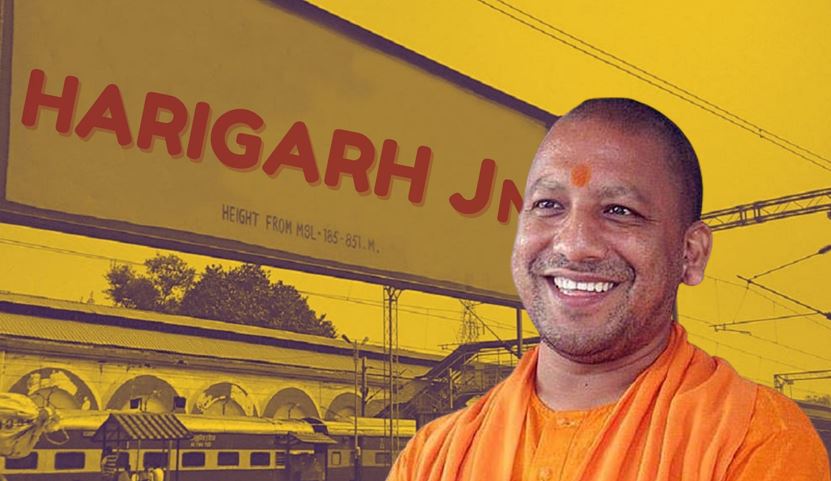Ever since Yogi Adityanath took over as Chief Minister of Uttar Pradesh in 2017, he has been renaming several UP districts to refurbish the image. Earlier in August this year, Yogi Adityanath led Uttar Pradesh government stepped in with a decision to rename ‘Aligarh’ as ‘Harigarh’. However, the opposition along with left-liberal media, lacking the information on ideas, examples and objectives behind the move, trolled the UP government for this decision.
Read more: AMU had destroyed Aligarh’s image in the country, CM Yogi is now revamping it
Idea and objective behind the renaming of states
While ‘The Hindu’ shamelessly tried to demean the Indian history to defend the Muslim invaders through their article titled ‘The reason for renaming places’, it probably forgot how they tried to destroy India’s culture as well as its prosperity. The article read, “We have been told — and we believe — that Bharat was once a “Sone Ki Chidiya (a golden bird)”. The era of the Guptas is referred to as “SwarnaYug (golden period)”. This historical imagination leads us to believe that the golden age ended with the coming of the Muslims and all we have to do now is go back to that period.”
Left media portals along with liberals across the country need to understand that the name of a particular place defines its historic past and the country’s opinions as well. With the renaming of the states, historic correctness is being done to project India’s prosperous and highly rich culture. The government also aims at spreading awareness among the youth of the nation to rejuvenate its flourishing history.
The history behind renaming culture
After India’s Independence, several roads in New Delhi such as Kingsway and Queensway have been renamed Raj Path and Janpath respectively. Additionally, Curzon Road was also renamed Kasturba Gandhi Marg.
Kerala was created after merging Travancore-Cochin and adjoining areas. Moving further, in 1969, Madras state was renamed Tamil Nadu along with Mysore renamed Karnataka. Not only the names but the British spellings of cities were also changed to rectify the problem and make them more Indian. In such a move, Cawnpore became Kanpur and Jubblepore became Jabalpur.
Also read: These Indian cities should be renamed Immediately
Another wave of renaming appeared in the 1980s and 90s with a motive to “reclaim” names of prominent cities as prevalent in respective local traditions and languages. The Bharatiya Janata Party (BJP)-Shiv Sena government in Maharashtra assembly had once approved Mumbai rejecting the name Bombay, which was a legacy of British colonialism. The Dravidian parties, in Tamil Nadu, abandoned Madras to rename its capital city Chennai. Similarly, Calcutta became Kolkata, Baroda became Vadodara, Trivandrum was back to being Thiruvananthapuram and the list goes on.
British names rejected, Mughals being glorified
Considering the above instances, it is to be questioned that if British names and spellings were abandoned to reclaim the nation’s history, then, why Mughals are being glorified?
If Kingsway and Queensway can be renamed as Raj Path and Janpath respectively, then how is it unjustified to reclaim what Mughals erased from India’s history?
Global examples
However, it is not only in India where renaming states has been a crucial move to reclaim the nation’s history, several other countries in the world have done the same in the past. Recently, The Māori party has launched a petition to change New Zealand’s official name to Aotearoa, the te reo Māori, an indigenous language name for the country.
TePāti Māori leaders, Rawiri Waititi and Debbie Ngarewa-Packer said, “It’s well past time that Te Reo Māori was restored to its rightful place as the first and official language of this country.” “We are a Polynesian country – we are Aotearoa.”
Procedure for renaming
While the concerned civic authority, Zilla Parishad or Panchayat, approves or rejects the proposals to rename a street, it requires the concerned state cabinet to take the decision regarding the renaming of a city.
Moving further, if it is to be renamed, the state legislature needs to pass a resolution for the same, which is then needs to be sent to the Centre. Since it requires the amendment of the Constitution for the same, The Union cabinet has the authority to approve or reject. The proposal to change the name of a state requires amending Schedule 1 of the Constitution of India.
Read more: Glory of Prayagraj has been restored, thanks to CM Yogi
However, despite the liberal mafia’s attempts to target and malign the Chief Minister, Yogi, driven by public support, has been undeterred in his untiring attempts to revive the true culture of the state. Thus, those mocking him for renaming Aligarh as Harigarh need to realize that what they call renaming is, in fact, reclaiming.
